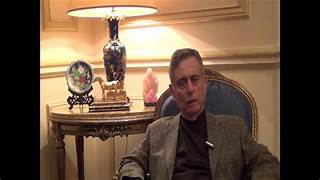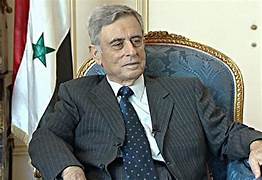Abdel Halim Khaddam raised concerns about the political maneuvers of the Syrian regime during the Geneva II conference and the potential risks of removing President Bashar al-Assad without dismantling his regime.
Khaddam, who previously served as Syrian vice president before defecting in 2005, stated, “Recently, an agreement was reached between the United States and Russia to convene a conference in Geneva aimed at finding a negotiated solution to the bloody crisis in Syria. Unfortunately, these two countries failed to consider that any dialogue not held between two equal forces will favor the stronger party. Bashar al-Assad possesses all the means of killing and destruction, while the Syrian people rely on their faith in God and their determination to achieve liberation, despite the imbalance of weapons.”
In a recording posted online on Tuesday, Khaddam further expressed doubts about the validity of the representation of the Syrian National Coalition. He claimed that it was originally formed based on the remnants of the National Council with the intention of preparing it to negotiate with the regime. Khaddam argued, “The coalition lacks the ability and authority to negotiate on behalf of the Syrian people. The only entity that possesses such legitimacy is a comprehensive national conference composed of the Syrian people fighting for freedom and salvation.”
Khaddam emphasized that the process would take time and extend until the end of Bashar al-Assad’s presidential term. He believed that the departure of Bashar al-Assad would not signify the departure of the regime itself. According to Khaddam, Bashar is merely the president of the regime, while the regime is an institution established by Hafez al-Assad in the early 1970s, representing an alternative to the state and replacing constitutional institutions.
Regarding the conflict, Khaddam noted that it extends beyond the Syrian people and Bashar al-Assad, encompassing the people, Bashar al-Assad, and the regime established by Hafez al-Assad. He identified the Iranian intervention as the distinguishing factor between the father and son’s rule. After the assassination of Rafik Hariri, Bashar had no option to safeguard himself and his regime except by aligning with Iran. This alignment resulted in Hezbollah being at his disposal for use at any time and in any location.
Uprooting Hezbollah
The former Syrian vice president made a prediction that, following Assad’s departure, the new Syrian army would intervene in Lebanon to eliminate Hezbollah. He cautioned Arab countries about the potential influence of Iran if they were to prevail in Damascus.
He stated, “He [Assad] did not comprehend the danger of his actions in entering Syrian territory and killing Syrians. This will come back to haunt him. The regime will collapse, and the new Syrian regime will enter Lebanon to eradicate Hezbollah. The Syrian people’s blood is not cheap, and Hezbollah will face consequences once the Syrian people regain control.”
Khaddam accused the loyalists of the Syrian regime of involving the Alawite community in a conflict that does not serve their interests. He added, “This regime will pay the price, and all those who supported and fought alongside it will be held accountable. Mediation or international pressure will not be able to save the criminals.” He also blamed Iran for exploiting sectarian tensions to manipulate Shiite communities worldwide, turning them into passive forces to be utilized as per its interests.
Addressing the Arab countries, Khaddam urged them to recognize the danger posed by the events in Syria, not only for Syria itself but for the entire region. He warned that if Iran triumphs in Damascus, it will not limit its ambitions and will seek to impose its policies on everyone. He expressed surprise at the silence of the United States and some Western countries regarding Iran. He concluded by conveying his greetings to the Syrians, assuring them that no matter how challenging and complex the circumstances may be, they will emerge victorious.



